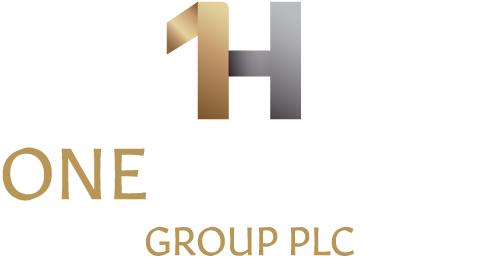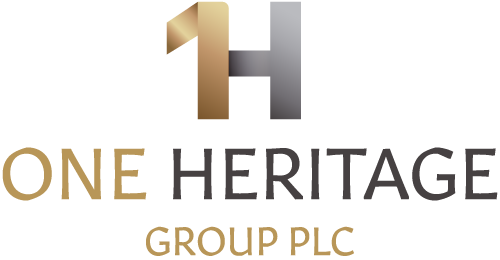Corporate Governance
Corporate Governance


Show menu
Corporate Governance
One Heritage Group plc (“the “Group”) is committed to operating high standards of corporate governance and our corporate governance model is based on the key principles of the Quoted Companies Alliance Corporate Governance Code (“QCA Code”).
The board will continue to develop its corporate governance processes and procedures and is committed to continuously updating this statement when appropriate.
The following statements set out the Group’s compliance with the QCA Code:
1. Establish a strategy and business model which promotes long-term value for shareholders.
The Group’s strategy is focused on developing high quality apartments and co-living housing in urban areas in the UK with high demand from professional tenants. We provide first class letting and full management services to create a socially sustainable living environment.
The Group aims to deliver shareholder value by investing in developments in areas of high demand and growth. The Group also believes that it can create value in the residential market and are excited to be part of the solution to tackling the UK’s shortage of quality accommodation.
2. Seek to understand and meet shareholder expectations.
The Group provides its shareholders with contact information such as a dedicated email address (investors@one-heritage.com), Group phone number and address which is available on the Group’s website. The Group holds an annual general meeting which all investors can attend, and time will be set aside for questions.
Due to the size of the Group, there is no dedicated investor relations department. The CEO is responsible for reviewing all communications received from investors and will determine the most appropriate response.
Individual contact details of the CEO, CFO and Hybridan, the Group’s financial adviser are published on all RNS releases which are also uploaded to the Company website.
3. Take into account wider stakeholder and social responsibilities and their implications for long-term success.
The Group believes its main stakeholders in addition to its investors are its employees, suppliers, consultants, purchasers of the Group’s properties, members of local communities where the Group undertakes development activities, and our tenants. The Group is committed to understand the requirements and needs of its stakeholders, monthly meetings are held by management to discuss engagement and feedback and the Group takes time to review these requirements.
It is important for the Group to be making a positive contribution to local economies, communities, and the housing shortage. The Group recognises its social responsibility and the impact it has on providing sustainable housing, follow best practice so that developments provide a safe and environmentally friendly living experience. Development proposals are in line with planning regulations and recommendations where future regulations may change, and where advisable, the Group will hold public consultation events as part of any planning applications.
4. Embed effective risk management, considering both opportunities and threats, throughout the organisation.
The Group maintains a risk register and monitors risks associated with the business including finance, legal, personnel, and macro and micro environmental factors. Risks are assessed and discussed at management and board level on a regular basis, assessing the impact, likelihood and the mitigation strategies are carefully considered. The risk register is tabled at the Group’s audit committee for further assurance as to the strength and sustainability of its management strategy to risk. The audit committee is expected to meet at least three times a year at appropriate intervals in the financial reporting and audit cycle and otherwise as required.
5. Maintain the board as a well-functioning, balanced team led by the chair
One Heritage Group PLC has a board of directors that comprises three executive directors and two Independent non-executive directors which includes an Independent non-executive chairman. The board is committed to meeting at least monthly formally or informally. Under Article 78.1 of the Company’s Articles of Association each director shall retire from office at the third annual general meeting after the annual general meeting or general meeting (as the case may be) at which he was previously appointed. Any new Directors appointed during the year must stand for re-appointment at the annual general meeting following their appointment. The Company intends to comply with its Articles of Association and guidance set by the QCA code.
The Executive directors consist of a full-time CEO and CFO along with a part time CIO. The Independent Non-Executive directors consist of an Independent Non-Executive Chairman and an Independent Non-Executive Director with service contracts that require a minimum of 2 days a month dedicated towards their duties as directors of the Group.
Each director of the Group has particular regard to the QCA corporate governance code in respect of the role of the board and the role of its independent nonexecutive directors. As the Company continues to grow board membership will be continually assessed to reflect the skills and attributes required.
Audit and Risk Committee
The Company has established an audit and risk committee, which comprises all of the Directors and Jeremy Earnshaw as the chairman. The audit committee will meet at least three times a year and will assist the board in observing its responsibility for ensuring that the Company’s financial systems provide accurate and up-to-date information on its financial position and that the published financial statements represent a true and fair reflection of this position. It will also assist the board in ensuring that appropriate accounting policies, internal financial controls and compliance procedures are in place. The audit committee will receive information from the external auditors and will seek to challenge the management where necessary. The Committee will also consider any new or potential risks posed to the Company and will identify the mitigants and controls necessary to ensure that such risks are managed in a manner appropriate to the size and complexity of the Company’s operations at that time.
Remuneration Committee
The Company has established a remuneration committee, which will comprise the two independent non-executive directors, those being Jeremy Earnshaw and David Izett. The remuneration committee will meet at least once a year and otherwise as required. The remuneration committee has responsibility for making recommendations to the board on the Group’s policy on the remuneration of the executive directors. The remuneration committee is responsible for reviewing the scale and structure of the executive directors’ remuneration and the terms of their service or employment contracts, including share option schemes and other bonus arrangements. The entire board sets the terms and conditions of the remuneration of the Directors.
Nominations Committee
The nominations committee will meet at least once a year and otherwise as required. The committee consists of two members. The chairman of the nominations committee must either be an independent director or the chairman of the board (save when discussing his succession). Accordingly, David Izett has been appointed as chairman of the nominations committee, the other member being Jeremy Earnshaw. The nominations committee considers the composition of the board, retirements and appointments of additional and replacement directors and makes appropriate recommendations to the board. In addition, the nominations committee will recommend changes to the board where specific skills and experiences are required to achieve the Company’s future development plans.
6. Ensure that between them the directors have the necessary up-to-date experience, skills and capabilities.
The board bring relevant experience in the property sector, finance sector, business operations and the public markets. The directors of the Group comprise a mixture of two entrepreneurial, and dynamic executive directors who founded the Group and an experienced CFO, which is balanced by the experience of two independent non-executive directors with significant public markets experience. The Group believes that this cognitive diverse experience of the board provides a sufficient balance to promote the success of the business.
Each director is identified on the Company’s website along with a clear description of their role and experience.
The Group has access to a financial advisor to update the board on key business, legal and regulatory issues facing the Group. The board also has access to the Company Secretary, who advises them on board and governance matters.
The Group has not to date sought external advice on keeping directors’ skills up to date but believes that the mixture of experience provides them with the relevant up to date skills needed to act as board members for a small Group.
7. Evaluate board performance based on clear and relevant objectives, seeking continuous improvement.
The Group’s directors are evaluated against the Group strategy as outlined in the prospectus dated 23 December 2020. The board intend to consider how formal assessments of board performance will be conducted in the future and will also consider succession planning as and when necessary. The longer-term performance of the board is being considered by the Group and announcements will be made on this matter when appropriate.
8. Promote a corporate culture that is based on ethical values and behaviours
The board believes that the promotion of a corporate culture based on sound ethical values and behaviours is critical to gain a competitive advantage and maximise shareholder value. The Group maintains a handbook which is available to all employees which sets out standards expected which are a benchmark for the evaluation of performance during periodic employee reviews which are undertaken at least annually. Senior management hold an Employee Engagement meeting monthly with staff matters, employee feedback, employee engagement and professional training/development all standing agenda items. The CEO also reports on any notable examples of actions within the Group that are misaligned with the Group’s stated values at every board meeting.
The directors believe its corporate culture encourages ethical behaviours that benefit its stakeholders and promote the success of the business.
9. Maintain governance structures and processes that are fit for purpose and support good decision-making by the board
The Chairman is responsible for leadership of the board, ensuring its effectiveness and setting the agenda for board meetings. Once strategic objectives have been agreed by the board, it is the Chief Executive Officer’s responsibility to ensure they are delivered upon and consistently to be accountable to the board. The day to day operations of the Group are managed by the Chief Executive Officer and the wider management team comprising the Chief Investment Officer, Chief Financial Officer and Development Director.
There is a clear division of responsibilities between the Chairman, Chief Executive Officer, and Non-Executive Directors. The roles of the Chairman and the Chief Executive Officer are separate with a distinct division of responsibilities. The separation of authority enhances independent oversight of the executive management by the board and helps to ensure that no one individual on the board has unfettered authority.
The board’s primary role is the protection and enhancement of long-term shareholder value. To fulfil this role, the board is responsible for the overall management and corporate governance of the Group including its strategic direction, establishing goals for management and monitoring the achievement of these goals. In addition to overall Group strategy, the board approves the annual budget and retains control over corporate activity, material contracts and financing decisions. Management’s role is to implement the strategic plan established by the board and to work within the corporate governance and internal control parameters established by the board. The role of each of the Group’s committees have been explained in Principle 5 above.
10. Communicate how the Group is governed and is performing by maintaining a dialogue with shareholders and other relevant stakeholders
The Group publishes all RNS announcements, prospectus, and investor presentations on the Group’s website. The Group releases Annual Reports, holds Annual General Meeting, and all circulars, dates and content will be posted directly to all shareholders and nominees, and published on the Group’s website.
The Group website allows investors, stakeholders and other interest parties to contact the Group. The Group intends to create a mailing list to contact stakeholders directly.
Updated October 2023

CONTACT
80 Mosley Street,
Manchester M2 3FX
0161 806 1498
uk.info@one-heritage.com


